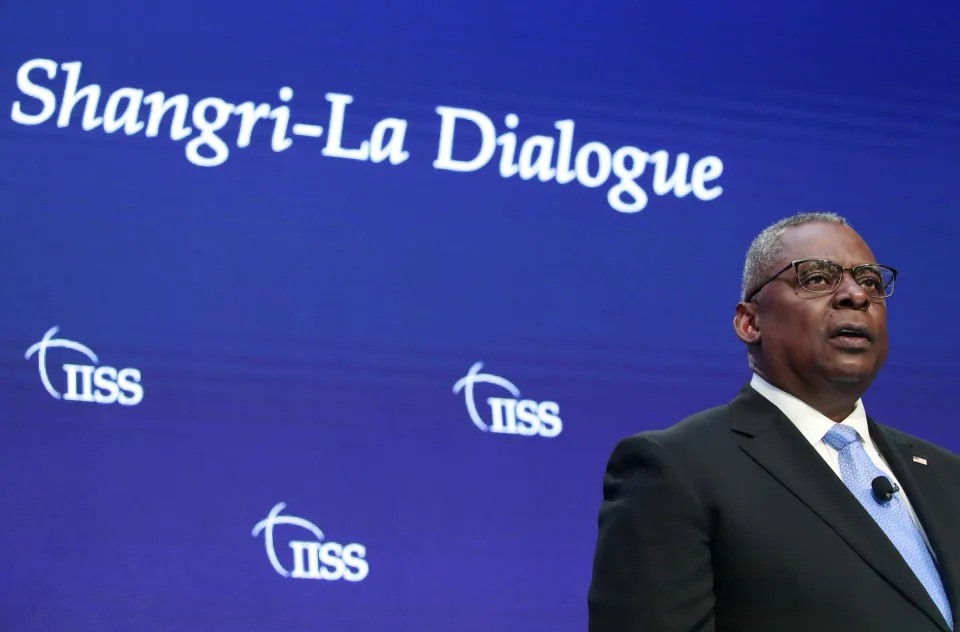The US Secretary of Defense, Lloyd Austin, affirmed today in a forum in Singapore that the Indo-Pacific is the “priority theater of operations” of his country and reiterated his support for his allies in the face of an “increasingly aggressive” China, especially towards Taiwan and against the backdrop of the war in Ukraine.
“We stand with our friends as they stand up for their rights, which is especially important as the People’s Republic of China maintains an increasingly aggressive approach to its demands,” Austin said in a speech in Singapore at the Shangri-La Dialogue, the forum for most important security in the region.
Austin, who yesterday had his first face-to-face meeting with Chinese Defense Minister Wei Fenghe since he was sworn in in January, alluded to China repeatedly, unusual in a forum accustomed to more subtle diplomacy, drawing parallels with the invasion. Russia from Ukraine and an eventual similar act from China in Taiwan.
The Secretary of Defense of the world’s leading power used the war in Ukraine to illustrate what happens when a power “with imperialist zeal” transgresses international norms, dissuading China from doing the same with what it considers to be the “rebellious island”.
“The situation is especially raw in Taiwan,” Austin considered, referring to some moves by Beijing that he described as “dangerous”, referring to, among others, the sending of planes from the Chinese People’s Liberation Army (PLA) to the strait from Formosan.
China, which has claimed sovereignty over Taiwan and considered it a rogue province since Kuomintang nationalists withdrew there in 1949 after losing the civil war, has never ruled out resorting to force to take full control of the island.
Although Austin assured that the United States is opposed to “any unilateral change” in the status quo of Taiwan, he assured that his country remains “firmly committed to the one-China policy”, and maintained the traditional “strategic ambiguity” of the United States in order not to clarify whether would intervene militarily in the event of an attack by Beijing.
THE IMPORTANCE OF THE INDOPACIFIC
On the other hand, his speech was full of mentions of the importance of the Indo-Pacific for the United States, after in recent years countries in the area have questioned Washington’s priorities in the face of the domestic withdrawal of the previous administration and now the demands of the situation in Ukraine.
Calling the Indo-Pacific the “center of gravity” of US defense policy, Austin highlighted the progress of US alliances, particularly the Quad (with Japan, India and Australia) and the Aukus (with Australia). and the United Kingdom), as well as joint military exercises in the area or the commitment to the denuclearization of North Korea.
“We will continue to maintain our presence in the Indo-Pacific,” he insisted, in the face of China’s expansionism, citing as an example Beijing’s construction of artificial islands in the South China Sea, where the world’s second-largest economy disputes territory with neighboring countries, or the advance of Chinese troops on the border with India.
A series of threats that Austin considered require that the United States maintain its presence in the area, in which China is gaining ground, although he ruled out that the objective is to create an Asian NATO or return to a bloc policy as in the cold war, as Beijing has hinted.
“I continue to believe that great powers bear great responsibilities,” he said, stating his goal of boosting communication with the Chinese side.
That was one of the most hopeful aspects of yesterday’s meeting between Austin and Wei, which lasted twice as long as expected (about 60 minutes) and in which both promised to seek more channels of communication to avoid a further escalation of tensions. , advancing that there would be another meeting in the future.
After Austin’s intervention, which since his arrival in Singapore has held numerous bilateral talks with his counterparts from allied countries, including Japan, South Korea or Australia, Wei will take the podium on Sunday to expose the Chinese vision before the closing of the forum.
A summit that, held in person for the first time since the covid-19 pandemic emerged, takes place against the background of the war in Ukraine, which has fueled fears that some of the hot spots in the Indo-Pacific will explode, with the sea of South China as one of them, in addition to Taiwan.
In one of the forum’s panels, Hishammuddin Hussein, Defense Minister of Malaysia, a country that maintains territorial disputes with China in those waters, warned: “It is not alarmist to say that (the tensions in the South China Sea) could degenerate into one of the deadliest conflicts of our time, or of history”.

